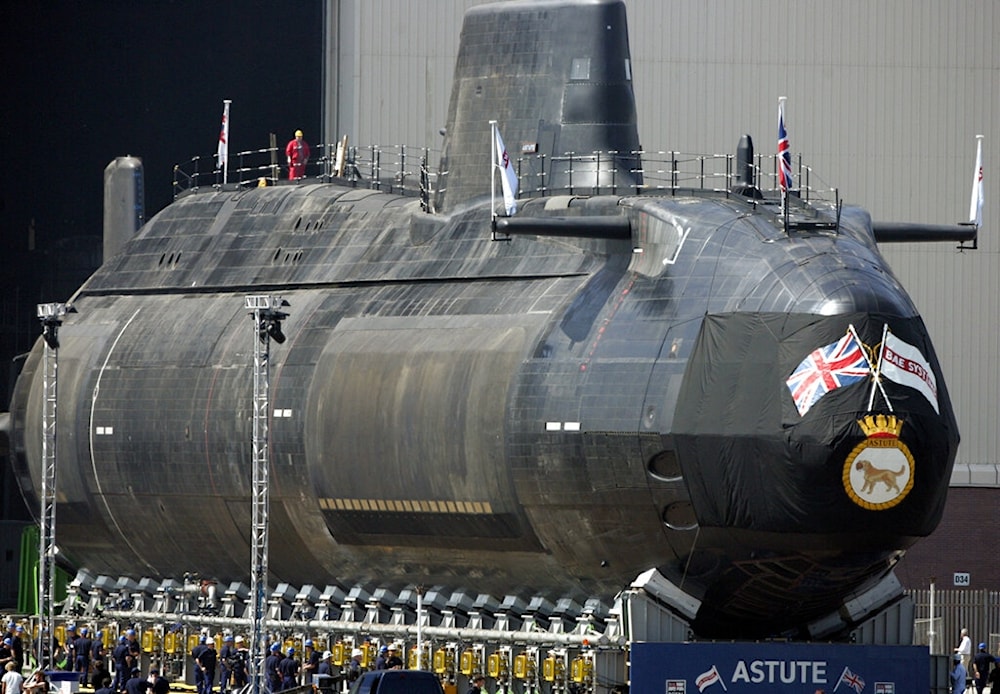Experts warn of uncertainty over US support for UK nuclear arsenal
The debate over the future of Trident, the UK’s aging submarine-launched nuclear missile system, has intensified in recent weeks amid concerns that Trump could withdraw the US from NATO.
-

In this file photo dated June 8, 2007, the first Astute class nuclear submarine is rolled out at the BAE Systems production plant in Barrow-in-Furness, Cumbria, England (AP)
Britain’s reliance on the United States to sustain its nuclear arsenal is now in question, experts warn, with potential alternatives involving European collaboration proving both costly and time-consuming, The Guardian reported on Saturday.
The debate over the future of Trident, the UK’s aging submarine-launched nuclear missile system, has intensified in recent weeks amid concerns that US President Donald Trump could withdraw the US from NATO, the report highlighted.
Even before this development, the £3 billion-a-year program faced multiple challenges, including questions over its efficiency and reliability, particularly after a second failed test launch last year. While cost concerns persist, the priority has been ensuring the timely replacement of Vanguard submarines rather than adhering to budget constraints.
Downing Street sought to downplay concerns earlier this week after diplomatic figures, including former British Ambassador to the US Sir David Manning, raised the prospect of an end to Anglo-American nuclear cooperation.
Calls for Britain to explore alternative plans have also gained support from former UK Foreign Secretary Sir Malcolm Rifkind, who initiated UK-France nuclear cooperation talks in the 1990s.
“It really is necessary for Britain and France to work more closely together because if American reliability ever came into question, then Europe could be defenceless in the face of Russian aggression,” Rifkind said.
He stressed that “the contribution by America must now be to some degree in doubt, not today or tomorrow, but over the next few years and certainly as long as Trump and people like him are in control in Washington.”
A Downing Street spokesperson insisted that Prime Minister Keir Starmer views the US as a dependable ally, stating, “The UK’s nuclear deterrent is completely operationally independent.”
However, unlike France, the UK remains deeply dependent on US support for its nuclear weapons, which are designed, manufactured, and maintained under a longstanding agreement dating back to 1958, The Guardian noted, adding that research from the University of Bradford indicates that as of 2008, Britain had only 50 missiles left from previous purchases of US stockpiles.
“Britain likes to call its nuclear posture independent, but it, of course, is absolutely not,” pointed out Hans Kristensen, a nuclear forces expert at the Federation of American Scientists.
“It may be that Britain can fire weapons independently of the US, but below that, the entire infrastructure covering missile compartments on submarines, the missiles themselves, all are supplied by the Americans,” he emphasized.
Defense analysts stress the importance of preparing for a scenario in which a deteriorating transatlantic alliance leads to Washington refusing to supply missiles to the UK, the report mentioned.
Dr. Marion Messmer, a senior research fellow at Chatham House specializing in nuclear weapons policy, warned that “it would be a big risk if it wasn’t being planned for, but it’s something the UK government can’t be too public about, as it wouldn’t want to give the Trump administration or Russia any ideas.”
Replacing Trident or adapting it for use without US support would be highly complex and expensive, she noted, though discussions are emerging about potential alternatives, such as shifting from sea-based to air-launched nuclear weapons.
“You wouldn’t necessarily be able to take the warheads which the UK uses for submarine launches and fit them for air launch. You would very likely need to develop a whole second warhead. That would require everything from new assembly facilities and workforce planning, but it could be a worthwhile investment for Britain,” she explained.
“You could hope that France – the most obvious contender for Britain to work with – has a delivery vehicle similar to Trident that could easily be adapted, but it would require the French government and the French nuclear enterprise being willing to share those designs with the UK.”
Read more: UK to maintain intelligence support for Ukraine amid US withdrawal

 4 Min Read
4 Min Read








